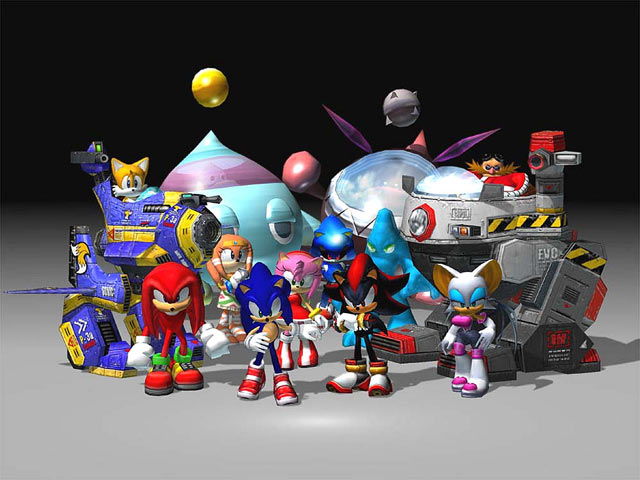
There have been a number of games that have got their start on a Nintendo console, only to jump ship later on, like Mega Man and Ninja Gaiden. Despite this, true Nintendo fans will always consider Nintendo their home, and many series from Nintendo’s past, such as Metal Gear, have recently returned home. At the same time, there have also been a great number of titles that didn’t start out on a Nintendo platform but have now found a home in the house that Mario built, like Resident Evil and Sonic the Hedgehog.
Homecomings
Of Dragons and Warriors
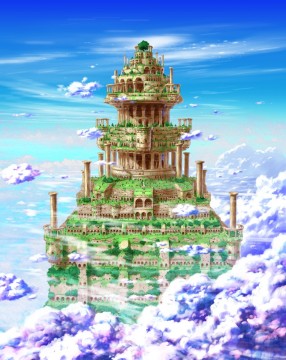 Out of all the series that got their start on a Nintendo console and returned, none may be as big as Dragon Quest. Dragon Quest is an insanely popular role playing game from Square Enix. The Dragon Quest series got its start back on the Nintendo Entertainment System in 1986, under the title Dragon Warrior stateside due to trademarking issues. It was released as Dragon Quest in Japan, and the series would eventually adopt its original title worldwide. Dragon Quest would remain on a Nintendo platform until the year 2000, when Dragon Quest VII: Warriors of Eden was released on Sony’s PlayStation. Nintendo fans then got remakes of older titles, but it seemed that the series had found a new headquarters on PlayStation.
Out of all the series that got their start on a Nintendo console and returned, none may be as big as Dragon Quest. Dragon Quest is an insanely popular role playing game from Square Enix. The Dragon Quest series got its start back on the Nintendo Entertainment System in 1986, under the title Dragon Warrior stateside due to trademarking issues. It was released as Dragon Quest in Japan, and the series would eventually adopt its original title worldwide. Dragon Quest would remain on a Nintendo platform until the year 2000, when Dragon Quest VII: Warriors of Eden was released on Sony’s PlayStation. Nintendo fans then got remakes of older titles, but it seemed that the series had found a new headquarters on PlayStation.
Yet Square Enix shocked the world in 2009, when it announced that Dragon Quest IX: Sentinels of the Starry Skies would launch exclusively on Nintendo DS. After 9 years, the Dragon Quest series was coming home. Sentinels of the Starry Skies was so popular in Japan that it had over 2 million preorders, and to date has sold over 4 million copies in Japan alone. While Square Enix handled publishing the game in Japan, Nintendo is publishing the title in international territories. Sentinels of the Starry Skies will hit America in just a couple days– July 11– and Europe on July 23.
High Tech Stealth
While Solid Snake didn’t get his “official” start on a Nintendo console, he did get his American debut in the 1988 NES port to 1987’s Metal Gear, which was released on the MSX2. The port was made by a team at Konami without the involvement of Hideo Kojima, and thus many changes were made to the game, with the biggest being the lack of a Metal Gear. A non-canonical sequel, titled Snake’s Revenge, was made for NES, again without Kojima’s involvement. The true sequel to Metal Gear was again for the MSX2, and never released in America.
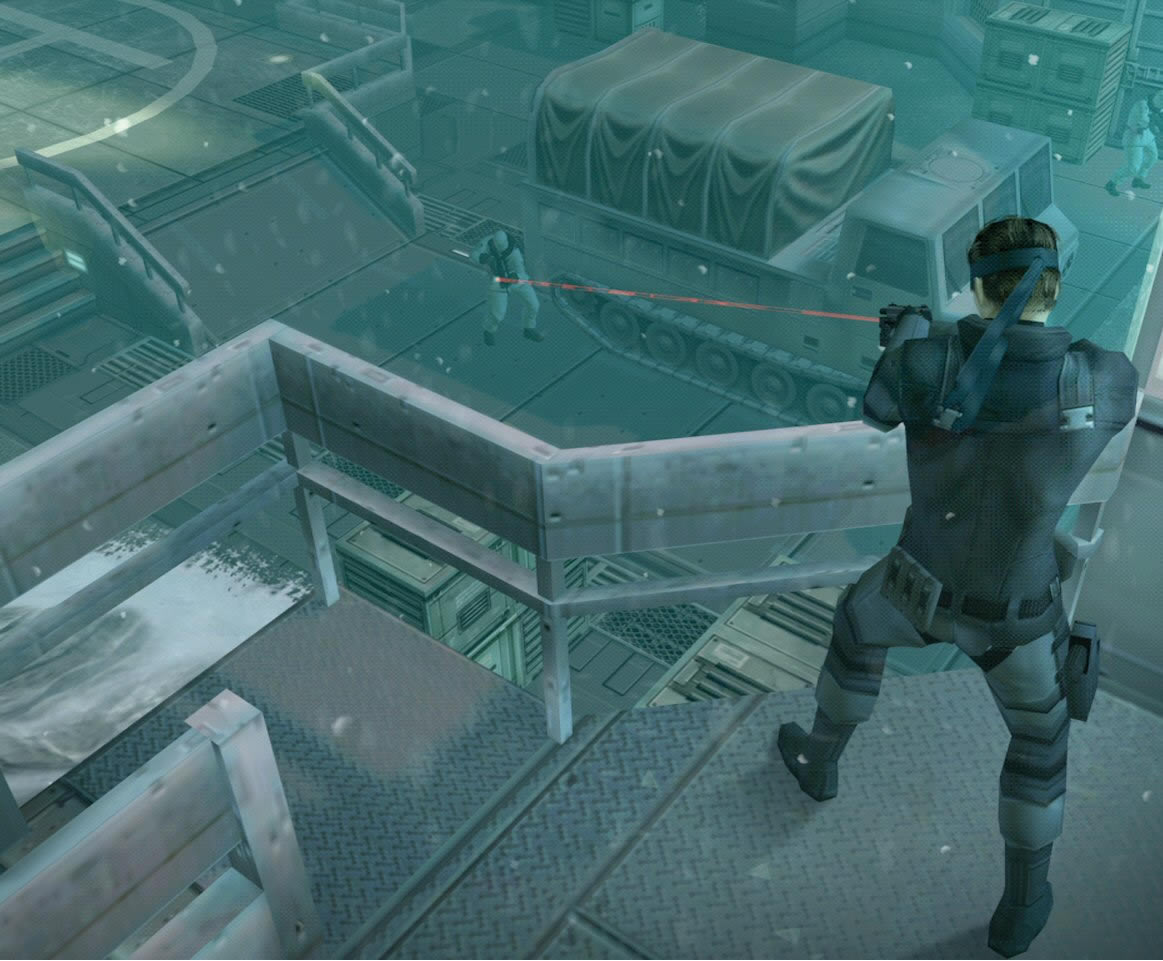
The next title in the Metal Gear series was Metal Gear Solid for the PlayStation in 1998, and this time it was released in America. While the rest of the series’ main titles have stayed away from Nintendo consoles, Metal Gear Solid did receive a remake, in 2004’s Metal Gear Solid: The Twin Snakes for GameCube, developed by Silicon Knights. Unlike the first two Metal Gear games released on Nintendo consoles, Hideo Kojima was actually involved this time. Most of the original voice acting cast reprised their roles in this updated adventure that featured not only enhanced graphics but enhanced controls. In short, the team at Silicon Knights took the controls from Metal Gear Solid 2: Sons of Liberty, and placed them in the visually superior remake of its predecessor. The title turned out to be fantastic, and Snake recently returned home again as a character in Super Smash Bros. Brawl. (Kojima had wanted Snake to be in Super Smash Bros. Melee, but had asked too late in its development.) While a new Metal Gear that’s not a remake is unlikely to hit Nintendo consoles (we do have Snake Eater 3D to look forward to on 3DS), Snake is now likely to return home with each new Super Smash Bros.
Mega Blast from the Past
Another huge series that got its start on a Nintendo console is Mega Man. Way back in 1987, Mega Man was released on NES. The first 6 Mega Man titles were all released on NES, and Mega Man 7 was released on Super NES. Things changed in 1996, with Mega Man jumping ship to the PlayStation, and later, Sega Saturn. However, the series had only taken a short break from Nintendo, as the next game in the series would again hit Super NES. 1998’s Mega Man & Bass was never released in America until it was remade for Game Boy Advance and released in 2003. Even though it didn’t have a number like the rest of the series, Mega Man & Bass shared gameplay mechanics and plot lines with the rest of the Mega Man series, including Mega Man 8.
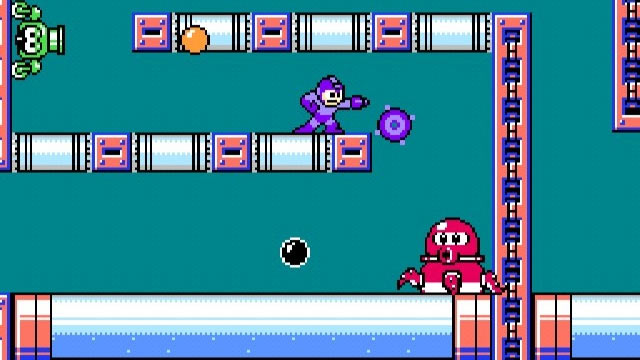
The Mega Man series took an extremely long vacation before finally coming back in 2008 as a downloadable title for every home console available– Mega Man 9, an 8-bit revival of the classic Mega Man series. This title is meant to run, story-wise, parallel to 1998’s Mega Man & Bass instead of follow after it. Despite being available on all three current-generation home platforms, it was released first on Wii, which may have been subtle acknowledgment of Nintendo as Mega Man’s home. This unofficial tradition continued when Mega Man 10 was released on WiiWare 10 days before it was on the PlayStation Network, and 30 days before it was on the Xbox Live Arcade. With the extreme popularity of Mega Man’s recent 8-bit titles, you can bet that he will be returning home a lot more often in the future.
Finding New Homes
Hedging Your Bets
Undoubtedly the biggest series that didn’t get its start on a Nintendo console, but found a new home there, is Sonic the Hedgehog. Sonic’s first game was Sonic the Hedgehog, released on Sega Genesis in 1991. He was a constant rival to Mario, up until the release of Sega’s final system. After the failure of the Dreamcast, Sega needed new platforms on which to launch Sonic titles, so it turned to Nintendo.
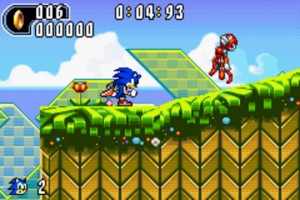 The first Sonic title released on a Nintendo home console was GameCube’s 2001 release Sonic Adventure 2: Battle, an upgraded port of Dreamcast’s Sonic Adventure 2. Yet if you’re truly keeping count, here in America, the amazing Sonic Advance for Game Boy Advance beat out SA2: B for the honor of being the first Sonic game on any Nintendo platform. Both titles were superb, with SA2: B being the last great console Sonic game in the minds of many Sonic fans, and Sonic Advance so good that it could have been called Sonic the Hedgehog 4.
The first Sonic title released on a Nintendo home console was GameCube’s 2001 release Sonic Adventure 2: Battle, an upgraded port of Dreamcast’s Sonic Adventure 2. Yet if you’re truly keeping count, here in America, the amazing Sonic Advance for Game Boy Advance beat out SA2: B for the honor of being the first Sonic game on any Nintendo platform. Both titles were superb, with SA2: B being the last great console Sonic game in the minds of many Sonic fans, and Sonic Advance so good that it could have been called Sonic the Hedgehog 4.
Sonic games continue to be released on Nintendo platforms today, and tend to sell better on them than on other systems. If that doesn’t say that Nintendo is Sonic’s new home, I don’t know what does. Together, Sonic and Mario have starred in Mario & Sonic at the Olympic Games, Olympic Winter Games, and not to mention Super Smash Bros. Brawl. It’s painful to see some of the games that Sega puts Sonic through these days, but hopefully one day he will find a more “permanent” home with Nintendo, and star in titles that will bring back all the respect and fun due to the Sonic name.
Horror Shambles to Nintendo
During the GameCube generation, Nintendo made a valiant attempt to lure back hardcore gamers who had left for the PlayStation 2 and Xbox. Key to this strategy was a deal with Capcom to bring the entire Resident Evil series to Nintendo’s purple box, ensuring that Nintendo would be the series’ home for at least one generation. This deal included three terrific games: Resident Evil 0; an upgraded remake of the original Resident Evil; and Resident Evil 4, a game that would change the RE series forever. In addition to these three new games, the GameCube would also receive ports of Resident Evil 2, Resident Evil 3: Nemesis, and Resident Evil: Code Veronica. Prior to Resident Evil 0, the only RE game released for a Nintendo console was Resident Evil 2 on Nintendo 64, which was an upgraded port of the PlayStation original.

Resident Evil 4 proved that mature games can sell on Nintendo consoles, and this was seen again with Resident Evil 4: Wii Edition, which sold over 1 million copies. The RE series originally started out as a survival-horror franchise, with its first game releasing on PlayStation in 1996. It focused on tight camera angles and chilling music. However, with the release of RE4, the series became more action-oriented, while still retaining chilling music, puzzles and typewriters for saving. While we may not see a new, numbered RE sequel on Nintendo’s current home console, hope of a true remake is always there. Nintendo is already home to a fantastic remake of the game that started it all, and we hope it’s only a matter of time until Capcom remakes the second. Perhaps Nintendo and Capcom can strike another deal.
And Last, a Crash
In 2002, GameCube got a port of a game in a series that was one of the greatest PlayStation had to offer: Crash Bandicoot. In 1998, Crash starred in his best game yet on PlayStation: Crash Bandicoot 3: Warped. Each Crash game continued to get better, but that would change with the release of his next title, The Wrath of Cortex. Unlike every previous title, which was developed by Naughty Dog, The Wrath of Cortex was developed by Traveller’s Tales. The new title lacked the polish, tight level design, and fun that Naughty Dog had imbued the series with– it was a game GameCube would have been better off without.
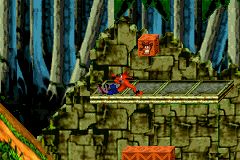 While TT couldn’t make a good Crash game, Vicarious Visions proved it could. VV had been in charge of making a portable Crash game for the Game Boy Advance, and Crash Bandicoot: The Huge Adventure is what they came up with. It launched earlier in the year than The Wrath of Cortex, yet was a much better game. The graphics were exceptional for GBA, and all of the sound effects were right out of the PlayStation titles.
While TT couldn’t make a good Crash game, Vicarious Visions proved it could. VV had been in charge of making a portable Crash game for the Game Boy Advance, and Crash Bandicoot: The Huge Adventure is what they came up with. It launched earlier in the year than The Wrath of Cortex, yet was a much better game. The graphics were exceptional for GBA, and all of the sound effects were right out of the PlayStation titles.
VV had struck gold, but unfortunately it was only handheld gold. The console Crash games continued to falter, and now it’s a franchise few people care or know about. Everyone complains how bad the Sonic games are today, but no one says a thing about Crash. Crash was trashed many times faster than Sonic was, and unfortunately, he may eventually fade from gaming unless he is saved by another company… like Nintendo. His series has already found a handheld home, but if anyone besides Naughty Dog could save the home console Crash games, Nintendo would have my bet. Some may disagree or cry blasphemy, but I believe that Crash would make a perfect addition to the next Smash Bros. What do you think?




 ShareThis
ShareThis







Crash Bandicoot? Holy crap, I haven’t heard nor seen that name in forever. He’s right up there with Spyro the Dragon in terms of … well, enough badmouthing. I don’t know if I want to see Crash back, haha. Resident Evil, on the other hand–well, I just finished up RE5 on PC, and really, thinking about that (or another numbered game) on a Nintendo console just gets me all excited.